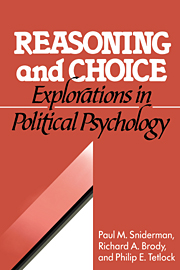Book contents
- Frontmatter
- Contents
- List of tables and figures
- Preface
- 1 Introduction: major themes
- 2 The role of heuristics in political reasoning: a theory sketch
- 3 Values under pressure: AIDS and civil liberties
- 4 The principle–policy puzzle: the paradox of American racial attitudes
- 5 Reasoning chains
- 6 The likability heuristic
- 7 Democratic values and mass publics
- 8 Ideological reasoning
- 9 Information and electoral choice
- 10 Stability and change in party identification: presidential to off-years
- 11 The American dilemma: the role of law as a persuasive symbol
- 12 Ideology and issue persuasibility: dynamics of racial policy attitudes
- 13 The new racism and the American ethos
- 14 Retrospect and prospect
- Notes
- Bibliography
- Subject index
- Author index
13 - The new racism and the American ethos
Published online by Cambridge University Press: 05 May 2010
- Frontmatter
- Contents
- List of tables and figures
- Preface
- 1 Introduction: major themes
- 2 The role of heuristics in political reasoning: a theory sketch
- 3 Values under pressure: AIDS and civil liberties
- 4 The principle–policy puzzle: the paradox of American racial attitudes
- 5 Reasoning chains
- 6 The likability heuristic
- 7 Democratic values and mass publics
- 8 Ideological reasoning
- 9 Information and electoral choice
- 10 Stability and change in party identification: presidential to off-years
- 11 The American dilemma: the role of law as a persuasive symbol
- 12 Ideology and issue persuasibility: dynamics of racial policy attitudes
- 13 The new racism and the American ethos
- 14 Retrospect and prospect
- Notes
- Bibliography
- Subject index
- Author index
Summary
Racial prejudice refers to how some people feel and think about blacks, racial discrimination to how they treat them. Plainly, the public opinion survey is well-suited for the study of prejudice; but consensually, it is not suited for the study of discrimination, since by definition an opinion survey only records opinions, not behaviors.
We want to urge a less self-denying ordinance, a slight relaxation of the definition of discrimination. Our interest is politics, so by racial discrimination we shall mean a person honoring a claim for government assistance for a white but refusing to honor exactly the same claim, made on exactly the same grounds, for a black.
Chapter 13 introduces a technique for the assessment of racial discrimination, so defined. As with Chapters 11 and 12, the technique capitalizes on computer-assisted interviewing. The key experiment – the “laid-off worker” experiment – makes particularly plain how our introduction of planned variations has burst the constraints of the traditional paper-and-pencil split-ballot technique. In the laidoff worker experiment five attributes of an unemployed worker are randomly varied: race, gender, age, marital–parental status, and work history. Because each is varied independently of the other, there are ninety-six different combinations in all, far more than could possibly be accommodated in the traditional technique.
One word of caution. Chapter 13 reports initial results. We have a high degree of confidence in them, but they do not represent our complete analysis of discrimination. In particular, it would be unwarranted – indeed, flatly wrong – to infer from the results of the laid-off worker experiment that racial discrimination no longer occurs. […]
- Type
- Chapter
- Information
- Reasoning and ChoiceExplorations in Political Psychology, pp. 244 - 260Publisher: Cambridge University PressPrint publication year: 1991
- 1
- Cited by

